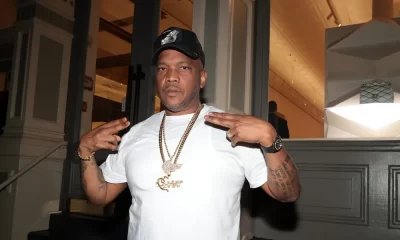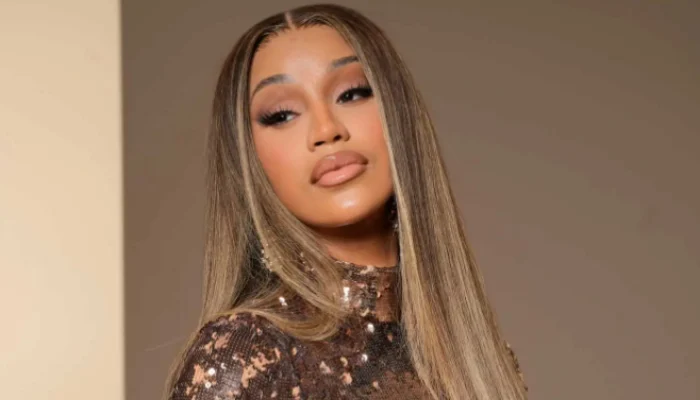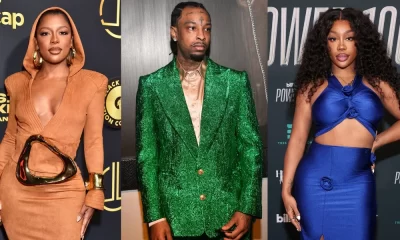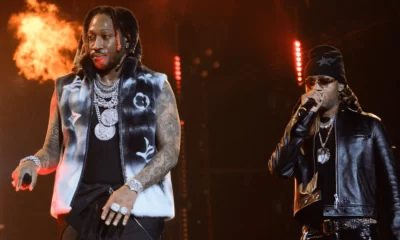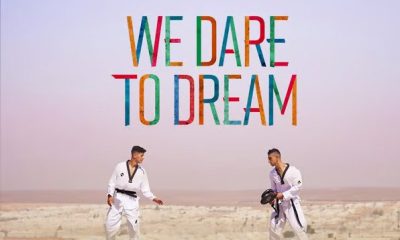ENTERTAINMENT
Chicago Hip-Hop’s Unified Sound & Artists
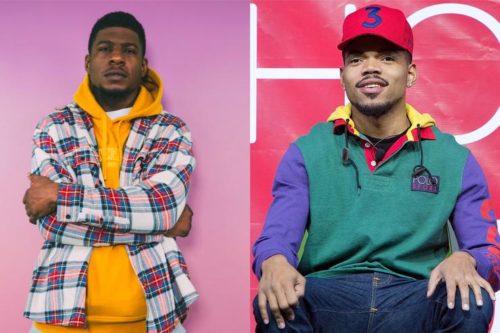
We take a look into the connections that surround the Chicago hip-hop scene and its most prominent artists.
There’s a hidden link that ties together the lyrics of many of Chicago’s biggest artists in hip hop today. “Me missing Brother Mike, like something heavy / My heart just wasn’t ready,” Noname raps on “Yesterday” from her debut album Telephone. “And I’m only getting greedier / And I’m still Mr. YouMedia,” says Chance the Rapper on the song “Acid Rain.” YouMedia is a non-profit youth center in downtown Chicago, co-founded by the late poet and educator Brother Mike Hawkins. Before tragically passing at the age of 38, Brother Mike started a weekly open mic at YouMedia that soon became a breeding ground for a new generation of Chicago hip hop artists. “The majority of the dope, young artists that are in Chicago came out of that b*tch,” Chance the Rapper said about YouMedia in an interview with Complex. Chance, Noname, Mick Jenkins, Saba, Vic Mensa, Donnie Trumpet, Jamila Woods and more all got their start at this open mic, and have since gone on to release projects that have come to define the sound of Chicago hip hop today.
—-
YouMedia is just one of the many poetry venues in Chicago that have helped spark this new movement of hip hop. Organizations like Young Chicago Authors, poetry festivals like Louder Than a Bomb, and open mic events like WordPlay have all contributed to making Chicago a rich hub for poetry. “What was happening back then was really the seed for all this sh*t happening right now,” Mick Jenkins said about the Chicago poetry scene in an interview with Green Room Magazine. At the end of YouMedia open mics, Saba would invite all the performers back to his home studio in his grandmother’s basement. At that time, Saba had already been recording Noname’s early works in that basement. “We had one of those houses where everybody in Chicago knew our door was open to them,” Saba said in an interview with NPR. “If it’s six people down there, then there’s six people on a song.”
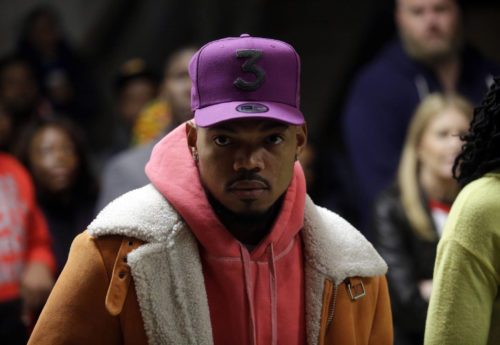
Chance the Rapper holds a news conference in Chicago’s City Hall – Joshua Lott/Getty Images
At YouMedia, Chance the Rapper met many of the producers who would end up contributing beats to his debut 2012 mixtape #10Day. When Chance got suspended from high school for ten days during his senior year on the account of smoking weed, he seized the opportunity and started feverishly recording. The product of this effort was a collection of soulful, jazzy and abstract hip hop songs tied together with Chance’s poetic lyricism. The mixtape’s highlight “Brain Cells” opens with the iconic lines “Here’s a tab of acid for your ear / You’re the plastic, I’m the passion and the magic in the air” over a laidback beat that wouldn’t be out of place on an Erykah Badu album. The Flying Lotus-produced cut “22 Offs” exhibited more of Chance’s tongue-twisting wordplay, using the syllable “off” exactly twenty-two times throughout the entire song. It wasn’t until his 2013 follow-up Acid Rap though, that Chance really began to find a signature sound and style.
While Chance mostly just worked off of already-finished beats he received through email for #10Day, Acid Rap was the product of working directly with producers in the studio to carefully craft a unifying sound. Inspired by acid jazz, soul, disco and funk, Acid Rap was free, experimental and unlike anything else at the time (or present). The opening track “Good Ass Intro” combined gospel choir vocals, trumpet and organ with the sputtering breakbeat drums of Chicago footwork. Acid Rap reflected the joy of growing up in Chicago, as well as the pain. “My big homie died young; just turned older than him / I seen it happen, I seen it happen, I see it always / He still be screaming, I see his demons in empty hallways,” Chance raps on the track “Acid Rain,” about his friend Rodney who was stabbed to death on the North Side of Chicago. Acid Rap was a resounding success, introducing the world to Chance, as well as to his fellow YouMedia regulars Saba, Vic Mensa, and Noname.
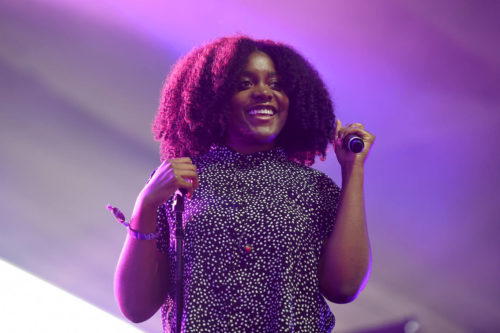
NoName performs at Panorama Festival in 2017 – Nicholas Hunt/Getty Images
Noname was born and raised in the Bronzeville neighborhood on the South Side of Chicago. She got into rapping in high school by watching Def Jam Poetry, a spoken word poetry TV series hosted by Mos Def. Seeking out venues for poetry in Chicago, Noname found the website for YouMedia. “That’s how I ended up going there and meeting [Chance and] all those people,” she told The Fader, “A Google search! A Google search changed my life, bruh.” In 2015, Noname featured on Donnie Trumpet & The Social Experiment’s song “Warm Enough,” delivering the hook “Who are you to tell me / I’m not warm enough for summertime?” This hook eventually inspired SZA to write the chorus “Is it warm enough for ya inside me?” on her 2017 track “Drew Barrymore.” Noname then released a string of singles, organized into the unofficial 2015 compilation “What The F*ck is a Noname Gypspy?” It wasn’t until 2016 though that Noname finally released her highly-anticipated debut album, Telefone.
In the summer of 2016, Noname and Saba rented an Airbnb in L.A., along with Chicago super-producers Cam O’bi and Phoelix, to craft Saba’s debut album Bucket List Project and Noname’s debut album Telefone. Phoelix and Cam O’bi, who had previously produced “Cocoa Butter Kisses” and “Good Ass Intro” for Chance’s Acid Rap, produced soulful instruments with smooth Rhodes keyboards, washed-out guitars, and live drum kits. Over the jazzy guitar chords of “All I Need,” Noname raps in a delicate yet confident flow, “Noname off the drugs, Noname quit the weed / Telefone delight, love is all I need.” Channeling her slam poetry origins, Noname’s raps sound like inner monologues, ranging from playful and humorous to deeply introspective. On other tracks, she delves into heavier themes of gun violence and police brutality. On “Casket Pretty,” Noname raps, “And I’m afraid of the dark, blue and the white / Badges and pistols rejoice in the night.”
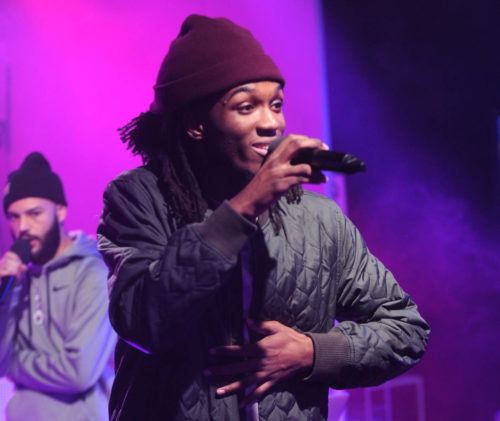
Saba performing in 2016 at MTV Studios – Brad Barket/Getty Images
Saba’s Bucket List Project was an equally successful effort. Revolving around the theme of life’s fragility and briefness, Bucket List Project intersperses its tracks with voicemail recordings of Saba’s friends saying what they want out of life. “I just want to play soccer on rooftops in Tokyo,” Billy Williams says on the track “Photosynthesis” (ft. Jean Deaux). Saba carries the project with vivid first-person storytelling, painting a picture of his Chicago upbringing on tracks like “Church, Liquor Store” (ft. Noname) – “It look like funeral home, church, church, liquor store / Corner store, dread-head, deadly, ditto.” Saba gained further attention in 2016 with his feature on the lead single “Angels” for Chance the Rapper’s third project Coloring Book. Produced by the Social Experiment, “Angels” had a strong gospel-rap sound that defined much of Coloring Book.
At the time of Coloring Book, Chance was at a crucial turning point in his life. He was just recovering from a lethal addiction to Xanax, got back together with his old girlfriend, and had a child who was born with a heart condition. These tumultuous experiences brought out a more spiritual side of the rapper, which was expressed both lyrically and musically with Coloring Book’s gospel themes. The album was highly ambitious, boasting over 25 features, including everybody from Kanye West and Young Thug to the legendary gospel singer Kirk Franklin. The anti-record label anthem “No Problem” (ft. 2 Chainz and Lil Wayne) was one of Chance’s catchiest songs yet, featuring the unstoppable hook “You don’t want no problems, want no problems with me,” backed by a gospel trap beat. The god-praising slow jam “Blessings” was also a Coloring Book highlight, with a church organ and jazz trumpet backing the catchy hook “When the praises go up, the blessings come down,” sung by Chance’s old friend from YouMedia, Jamila Woods.
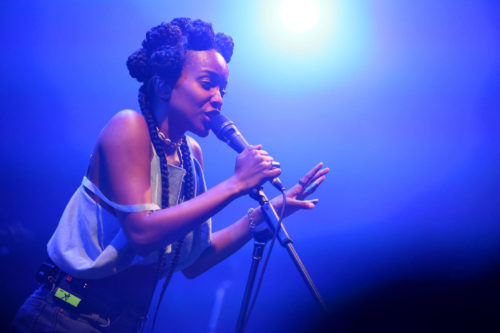
Jamila Woods performing at Panorama festival 2017 – Monica Schipper/Getty Images
Jamila Woods came from a similar background as her peers, growing up in Chicago, singing in her church’s choir, and getting into poetry through an afterschool program. In 2016, she released her debut album HEAVN, a magnificently lush mixture of jazz, soul and gospel. On tracks like “VRY BLK” (ft. Noname) and “Blk Girl Soldier” (Prod. Saba), Jamila Woods sings about Black pride and resiliency, with lines like “See she’s telepathic / Call it black girl magic / Yeah she scares the government / Deja Vu of Tubman.” On “LSD” (short for Chicago’s Lake Shore Drive), she sings about her home city, with the help of Chance the Rapper. Jamila is now the Associate Artistic Director of Young Chicago Authors, where she helps to organize Louder Than a Bomb, the same poetry festival where many of her friends got their start. She is set to release her second album LEGACY! LEGACY! this year.
2018 was an especially strong year for the Chicago YouMedia alumni. In April of 2018, Saba released his second album Care For Me, a deeply personal work about mental health and growing up in Chicago. On Care For Me’s lead single “LIFE,” Saba addresses the death of his cousin John Walt, who was stabbed to death in Chicago in February 2017. In September 2018, Noname released her second album Room 25, an intricate project that covers themes of politics, sexual freedom, and self-reflection. Executive produced by Phoelix, the album is filled with live instrumentation, soothing vocal harmonies, and even a string section that Noname paid for herself out-of-pocket. In October 2018, Mick Jenkins released his second studio album as well, Pieces of a Man. Backed by a combination of neo-soul and boom-bap, with multiple joints produced by Kaytranada, Mick’s dense wordplay, double entendres and vivid storytelling shine on Pieces of a Man. His flow is Gil Scott-Heron meets Ghostface Killah, who even features on the standout track “Padded Locks.”
Noname’s Room 25 features appearances from two other key players in the Chicago scene: Ravyn Lenae and Smino. Studying classical music at the Chicago High School for the Arts and taking inspiration from Disney songs, Ravyn Lenae makes experimental R&B songs with one-of-a-kind celestial melodies. She met rapper Smino and producer Monte Booker in 2015, forming a collective called Zero Fatigue. Backed by Monte Booker’s left-field electronic production, Ravyn Lenae released her first two EPs Moon Shoes in 2016 and Midnight Moonlight in 2017. An essential component to Chicago’s music scene, Ravyn Lenae has contributed her airy yet powerful vocals to Mick Jenkins’ “Communicate,” Noname’s “Forever,” Saba’s “California,” and Smino’s “Glass Flows,” just to name a few. Her latest EP, 2018’s Crush, is a collaborative project with The Internet’s Steve Lacey, laying down 70’s-inspired funk and disco production for Ravyn Lenae’s voice to soar on top of.
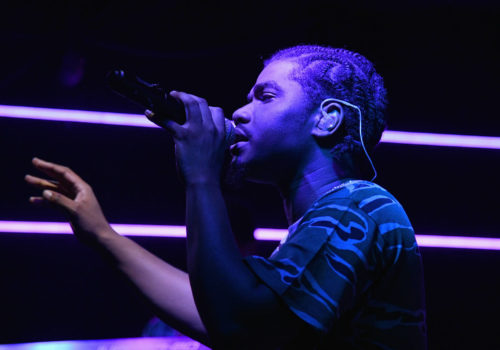
Smino performing at a Skull Candy launch party in 2018 – Bryan Bedder/Getty Images
Smino is originally from St. Louis but moved to Chicago for college once he started getting serious about music. “I f*ck with their community,” Smino told Rolling Stone, “There are people there that actually f*ck with each other.” Smino also had ties to Chicago through his cousin Drea Smith, who grew up in the city, and was already involved in an underground collective with Ravyn Lenae and Jean Deaux called Medicine Woman. But it was when Smino met producer Monte Booker that he really began to find his sound. With synths that sound like everything from bubbles to video games, and rhythms spanning hip hop, jazz, house and reggae, Monte Booker’s freeform approach to production pushed Smino to adopt a signature singing-rapping flow like no other. Smino has since guested on Noname’s song “Shadow Man,” Saba’s “World in My Hands,” and Ravyn Lenae’s “Spice.” His 2017 album blkswn featured the triumphant single “Anita,” which was remixed by T-Pain. In 2018, Smino released his follow-up album NOIR, which contains more of his signature vocal acrobatics.
Today’s hip hop and R&B scene in Chicago is wide and ever-expanding, but there is a core community of poetry and gospel that unites the scene under a common movement. Chance the Rapper, Noname, Saba, Mick Jenkins, Jamila Woods, Ravyn Lenae, Smino and Jean Deaux are only just a few of the extraordinary artists to come out of this expansive scene. And with many of them on only their first or second albums, we can expect even more innovative and soul-filling music from them in the future. Moreover, poetry outlets like YouMedia and Louder Than a Bomb continue to inspire the next generation of Chicago’s budding artists.
If you enjoyed this piece, you may also enjoy our three-part series of “Brief Hip-Hop Histories”
Our Brief History of G-Funk here.
Our Brief History of Jazz-Rap here.
Our Brief History of Rock-Rap here.
[via]


